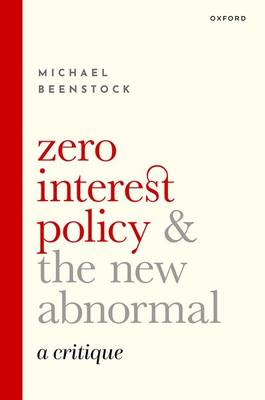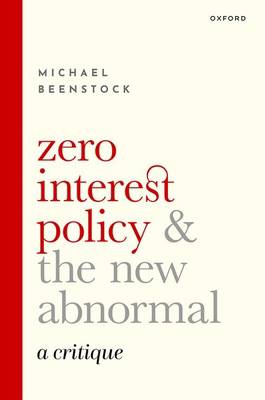
- Retrait gratuit dans votre magasin Club
- 7.000.000 titres dans notre catalogue
- Payer en toute sécurité
- Toujours un magasin près de chez vous
- Retrait gratuit dans votre magasin Club
- 7.000.000 titres dans notre catalogue
- Payer en toute sécurité
- Toujours un magasin près de chez vous
209,45 €
+ 418 points
Description
In the 'New Normal' central banks set their interest rate to zero and print money through massive quantitative easing, while finance ministries run huge fiscal deficits. Yet inflation remains minimal. Zero Interest Policy and the New Abnormal explains why. It also explains why the New Normal is really the New Abnormal, and why it can't last. This study traces the academic roots of the New Abnormal to a conceptual confusion about the 'natural rates of interest', and postmodernism in macroeconomics, exemplified by the DSGE (dynamic stochastic general equilibrium) movement.
It develops a theory of 'existential risk' which is concerned with the collapse of political economies such the Bretton Woods system and the New Abnormal. The book demonstrates that existential risk expresses itself in the growing gap between the natural rate of interest, measured by the rate of return on capital, and the real rate of interest, as well as in the development of cryptocurrencies. Beenstock develops a theory of 'kinetic inflation' based on Keynes' liquidity trap, which accounts for the absence of inflation in the New Abnormal, and predicts its outbreak when zero interest policy ends. He also explores the adverse social consequences of the New Abnormal for fertility, pensions, house prices, economic inequality, and intergenerational equity and establishes a causal link from the New Abnormal to Covid-19 mitigation policy, and from the latter to the intensification of the New Abnormal.
Finally, it assesses the prospects for ending the New Abnormal, and an orderly return to the Old Normal. The alternative is to crash-out of the New Abnormal chaotically.
It develops a theory of 'existential risk' which is concerned with the collapse of political economies such the Bretton Woods system and the New Abnormal. The book demonstrates that existential risk expresses itself in the growing gap between the natural rate of interest, measured by the rate of return on capital, and the real rate of interest, as well as in the development of cryptocurrencies. Beenstock develops a theory of 'kinetic inflation' based on Keynes' liquidity trap, which accounts for the absence of inflation in the New Abnormal, and predicts its outbreak when zero interest policy ends. He also explores the adverse social consequences of the New Abnormal for fertility, pensions, house prices, economic inequality, and intergenerational equity and establishes a causal link from the New Abnormal to Covid-19 mitigation policy, and from the latter to the intensification of the New Abnormal.
Finally, it assesses the prospects for ending the New Abnormal, and an orderly return to the Old Normal. The alternative is to crash-out of the New Abnormal chaotically.
Spécifications
Parties prenantes
- Auteur(s) :
- Editeur:
Contenu
- Nombre de pages :
- 388
- Langue:
- Anglais
Caractéristiques
- EAN:
- 9780192849663
- Date de parution :
- 02-11-22
- Format:
- Livre relié
- Format numérique:
- Genaaid
- Dimensions :
- 163 mm x 239 mm
- Poids :
- 752 g







